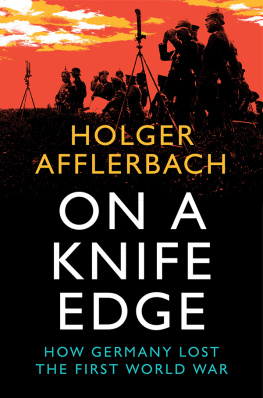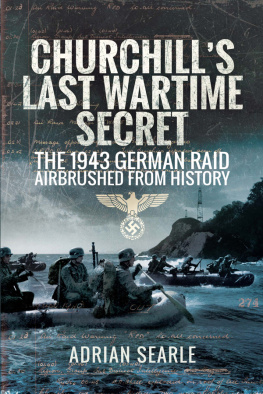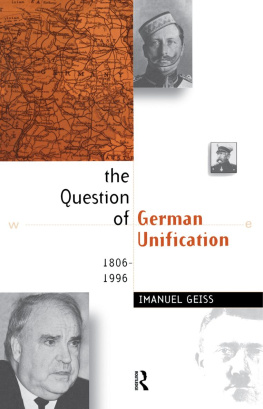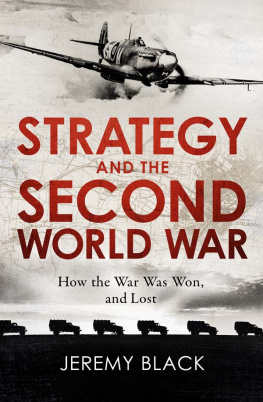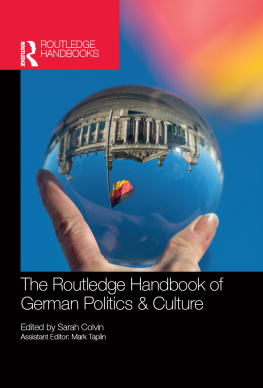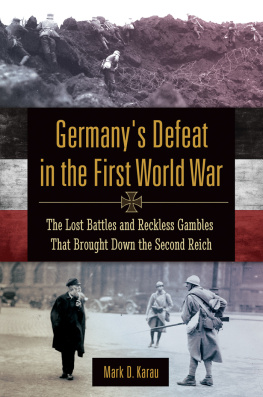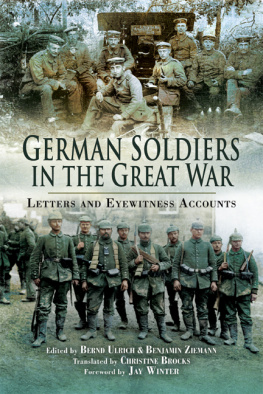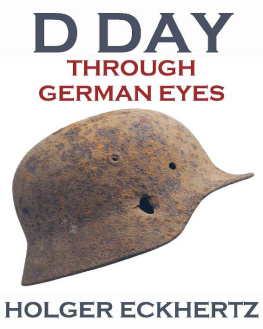
Contents
On a Knife Edge
Was the outcome of the First World War on a knife edge? In this major reassessment of German wartime politics and strategy, Holger Afflerbach argues that the outcome of the war was actually in the balance until relatively late in the war. Using new evidence from diaries, letters and memoirs, he fundamentally revises our understanding of German strategy from the decision to go to war and the failure of the western offensive to the radicalisation of Germany s war effort under Hindenburg and Ludendorff and the ultimate collapse of the Central Powers. He uncovers the struggles in wartime Germany between supporters of a compromise peace and hardliners who wanted to fight to the finish. He suggests that the German leadership was not nearly as committed to all-out conquest as previous accounts argue. Numerous German peace advances could have offered the opportunity to end the war before it dragged Europe into the abyss.
Holger Afflerbach is Professor of Modern European History at the University of Leeds. His previous publications include a biography of Erich von Falkenhayn, and a study of the Triple Alliance.
Cambridge Military Histories
Edited by
HEW STRACHAN, Professor of International Relations, University of St Andrews and Emeritus Fellow of All Souls College, Oxford
GEOFFREY WAWRO, Professor of Military History, and Director of the Military History Center, University of North Texas
The aim of this series is to publish outstanding works of research on warfare throughout the ages and throughout the world. Books in the series take a broad approach to military history, examining war in all its military, strategic, political and economic aspects. The series complements Studies in the Social and Cultural History of Modern Warfare by focusing on the hard military history of armies, tactics, strategy and warfare. Books in the series consist mainly of single author works academically rigorous and groundbreaking which are accessible to both academics and the interested general reader.
A full list of titles in the series can be found at: www.cambridge.org/militaryhistories
On a Knife Edge
How Germany Lost the First World War
Holger Afflerbach
Translated by Anne Buckley and Caroline Summers

University Printing House, Cambridge CB2 8BS, United Kingdom
One Liberty Plaza, 20th Floor, New York, NY 10006, USA
477 Williamstown Road, Port Melbourne, VIC 3207, Australia
314 321, 3rd Floor, Plot 3, Splendor Forum, Jasola District Centre, New Delhi 110025, India
103 Penang Road, #05 06/07, Visioncrest Commercial, Singapore 238467
Cambridge University Press is part of the University of Cambridge.
It furthers the University s mission by disseminating knowledge in the pursuit of education, learning, and research at the highest international levels of excellence.
www.cambridge.org
Information on this title: www.cambridge.org/9781108832885
DOI: 10.1017/9781108966313
Holger Afflerbach 2022
This is a translated publication of Auf Messers Schneide: Wie das Deutsche Reich den Ersten Weltkrieg verlor , written in German by Holger Afflerbach and published by C. H. Beck in 2018 (ISBN 9783406719691)
First published in English by Cambridge University Press in 2022
This publication is in copyright. Subject to statutory exception and to the provisions of relevant collective licensing agreements, no reproduction of any part may take place without the written permission of Cambridge University Press.
Printed in the United Kingdom by TJ Books Limited, Padstow, Cornwall
A catalogue record for this publication is available from the British Library.
Library of Congress Cataloging-in-Publication Data
Names: Afflerbach, Holger, author. | Buckley, Anne, 1967 translator. | Summers, Caroline, translator.
Title: On a knife edge : how Germany lost the First World War / Holger Afflerbach, University of Leeds ; translated by Anne Buckley and Caroline Summers.

